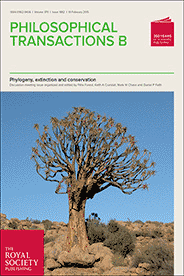Philosophical Transactions of the Royal Society B
Philosophical Transactions of the Royal Society B: Biological Sciences is a biweekly peer-reviewed scientific journal published by the Royal Society. The editor-in-chief is John Pickett (Cardiff University).[1]
 | |
| Discipline | Biology |
|---|---|
| Language | English |
| Edited by | John Pickett |
| Publication details | |
| History | 1887–present |
| Publisher | Royal Society (United Kingdom) |
| Frequency | Biweekly |
| Hybrid | |
| 6.139 (2018) | |
| Standard abbreviations | |
| ISO 4 | Philos. Trans. R. Soc. B |
| Indexing | |
| CODEN | PTRBAE |
| ISSN | 0962-8436 (print) 1471-2970 (web) |
| LCCN | 86645785 |
| OCLC no. | 01403239 |
| Links | |
Overview
Each issue covers a specific area of the biological sciences. Each issue aims to create an original and authoritative synthesis, often bridging traditional disciplines, which showcases current developments and provides a foundation for future research, applications and policy decisions. Each issue is edited by one or more expert guest editors.
The themes fall into one of four general categories:
- Cell and Development
- Health and Disease
- Environment and Evolution
- Neuroscience and Cognition
All articles become freely accessible one year after their publication date.
History

Philosophical Transactions of the Royal Society was established in 1665 by the Royal Society and is the oldest scientific journal in the English-speaking world.[2] Henry Oldenburg was appointed as the first (joint) secretary to the society and he was also the first editor of the society's journal. In 1887 the journal expanded to become two separate publications, one serving the physical sciences, Philosophical Transactions of the Royal Society A: Mathematical, Physical and Engineering Sciences, and the other focusing on the life sciences, Philosophical Transactions of the Royal Society B: Biological Sciences. Nowadays, both journals publish themed issues and discussion meeting issues, while individual research articles are published in the sister journal Proceedings of the Royal Society.
The journal celebrated its 350th anniversary in 2015. To commemorate this event it published a special collection[3] of commentaries on landmark papers from the archive by scientists such as Antonie van Leeuwenhoek, Hans Sloane and Alan Turing.
External links
References
- Pickett, John (4 January 2016). "Editorial: Comments from the new Editor". Phil. Trans. R. Soc. B. 371 (1687): 20150470. doi:10.1098/rstb.2015.0470. PMC 4760203. PMID 26729942.
- Philosophical Transactions: 350 years of publishing at the Royal Society (1665 – 2015) (PDF). The Royal Society.
- Partridge, Linda (6 March 2015). "Celebrating 350 years of Philosophical Transactions: life sciences papers". Phil. Trans. R. Soc. B. 370 (1666): 20140380. doi:10.1098/rstb.2014.0380. PMC 4360128. PMID 25750243.